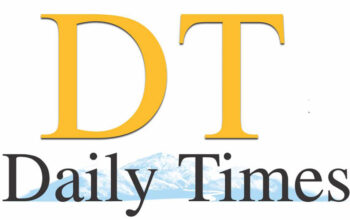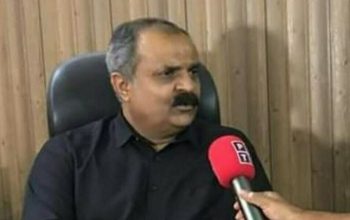Caretaker Prime Minister Anwaarul Haq Kakar on Tuesday reiterated that there were no moves by the Election Commission of Pakistan (ECP) to restrict the Pakistan Tehreek-e-Insaf (PTI) from participating in the upcoming general elections.
During an interaction with members of the media at Mayo Hospital in Lahore, the prime minister underlined the significance of adhering to legal constitutional provisions and ensuring a level playing field for all political entities during the electoral process.
Kakar assured that the ECP's main responsibility was to oversee free and fair elections, emphasising that the allocation of election symbols rested solely with the election commission.
The PTI had previously submitted a request to the ECP to release the written order of a judgment passed on August 30, which granted the party the bat symbol for the upcoming elections. Barrister Ali Zafar, a central leader of the PTI, had urged the commission to promptly provide a detailed decision in line with the verbal order given in August.
During the press conference, Kakar also emphasised the ECP's role as a constitutional body responsible for setting the date for the general elections, reiterating that the delimitation process was a constitutional requirement following the notification of census results.
He reaffirmed the caretaker government's commitment to ensuring equal rights and opportunities for all registered political parties to participate in the upcoming polls, stressing the importance of a fair electoral playing field.
The reassurance from the caretaker prime minister comes amid rising concerns and speculations about the PTI's participation in the upcoming general elections.
Palestine-Israel conflict
Commenting on Israel-Hamas conflict, the prime minister underscored Pakistan's efforts to urge the international community to play a role in halting hostilities by Israel.
Pakistan co-hosted an emergency session of the Organisation of Islamic Cooperation (OIC) with Saudi Arabia over the issue, he informed.
He said that he had conveyed Pakistan's sentiments and stance on the matter to various global leaders and the international media.
"Pakistan remained committed to playing a role in seeking a resolution to the conflict, demanding an immediate ceasefire and the opening of a humanitarian corridor in light of the ongoing crisis," he added.
Deportation of illegal immigrants
Regarding the repatriation of illegal immigrants, the prime minister categorised them into three groups. He said the government was fulfiling its international obligations for around 1.7 million registered refugees.
However, there were foreigners who had been living in Pakistan without documentation for years, and the government would facilitate their return once they completed valid and legal travel documents and visas. The third category involved identity theft, and mechanisms were in place to remove them from the database, he said.
Read More: PM Kakar peppered with hard questions at LUMS
The PM emphasised government's focus on regulated movement and clarified that the government's policy was not aimed at usurping the assets of foreigners claiming to hold businesses and properties in Pakistan. Relevant legal forums and institutions were available to address their claims.
SIFC decisions to remain unchallenged
The prime minister stated that the Special Investment Facilitation Council (SIFC) was a statutory body supported by previous legislation, and its decisions could not be challenged or undone.
Talks with IMF and economic progress
The prime minister said that negotiations with the International Monetary Fund (IMF) were progressing smoothly, and the government was confident that further negotiations for the second tranche of the standby agreement would be reached during the IMF delegation's visit to Pakistan in November.
The prime minister credited the government's crackdown on smuggling and illicit currency trade for reducing inflation and the rates of the US dollar and petroleum products.
He highlighted the positive impact of the move on the country's circular debt.
The government's efforts to combat illegal smuggling, particularly under the Afghan transit trade, had encouraged the local industry, which was now returning to productivity, he said. Economic indicators were showing a positive trend, he added.
The prime minister also stressed the importance of promoting Pakistan's history and culture to boost the tourism sector and commended provincial governments for initiatives aimed at attracting religious tourism.
CPEC ‘once in a century opportunity’
Separately, in an interview with China's Phoenix TV, the prime minister branded China-Pakistan Economic Corridor (CPEC) as a "once in a century-time opportunity."
He expressed Pakistan's focus on the project's second phase, aiming for rapid economic and industrial growth.
The PM acknowledged that CPEC, initiated under China's Belt and Road Initiative, had played a crucial role in driving significant development across various sectors in Pakistan.
He particularly highlighted the prospects for cooperation between China's Urumqi and Pakistan's northern Gilgit-Baltistan, especially in the domains of trade and tourism.
Anticipating substantial economic activity and an influx of tourists between the two countries, The PM emphasised the potential for improving the social and economic well-being of the people.
He envisioned Urumqi becoming a gateway for Pakistan to access mainland China, emphasising the mutually beneficial nature of this collaboration.
Read More: The 10 years of CPEC
Furthermore, the premier noted the progress achieved in Balochistan as a result of the province's integration into the CPEC projects.
He stressed that the benefits of the Belt and Road Initiative would extend beyond Pakistan, encompassing the entire region through the development of north-south roads and rail networks.
This, he argued, would enhance China's economic and political influence on a global scale.
During his visit to China, the PM expressed his admiration for China's impressive progress, describing the nation in three words as "dignified, huge, and self-confident."
Regarding Pakistan-China ties, he described them as "closest, most valuable, and deeply desired by both sides”.
He emphasised the intertwined nature of the relationship, likening the two countries to "one nation moving in the same direction."
On the subject of cooperation with China in green energy to combat climate change, the PM highlighted Pakistan's vulnerability to natural disasters and its commitment to raising the issue in various multilateral forums, including discussions with China.
He emphasised that climate change was a pressing concern that required collective action, given its potential to have far-reaching impacts on both Pakistan and the region.
Addressing concerns about the rise of China seen as a threat by some countries, the PM emphasised the need for cooperation rather than containment.
He noted that cooperation with China was the correct approach, given the emergence of China as a global power.
Relations with US
On the topic of relations with the United States, the PM highlighted continued cooperation in areas of security and counter-terrorism, underscoring Pakistan's commitment to fighting terrorism and extremism.
Ties with India
When asked about prospects for improving ties with India, the PM acknowledged the deep and complex challenges from the Indian side despite Pakistan's persistent efforts for peace.
He expressed a desire for peace but stressed that, without a resolution of the Jammu and Kashmir dispute, dialogue or normal trade activities with India remained "unthinkable."
Regarding the role of the international community in the settlement of the Jammu and Kashmir dispute, PM Kakar underscored the importance of prioritising moral principles over self-centered strategic interests, advocating for a just resolution to the longstanding issue.
Read the full story at the express tribune website.

